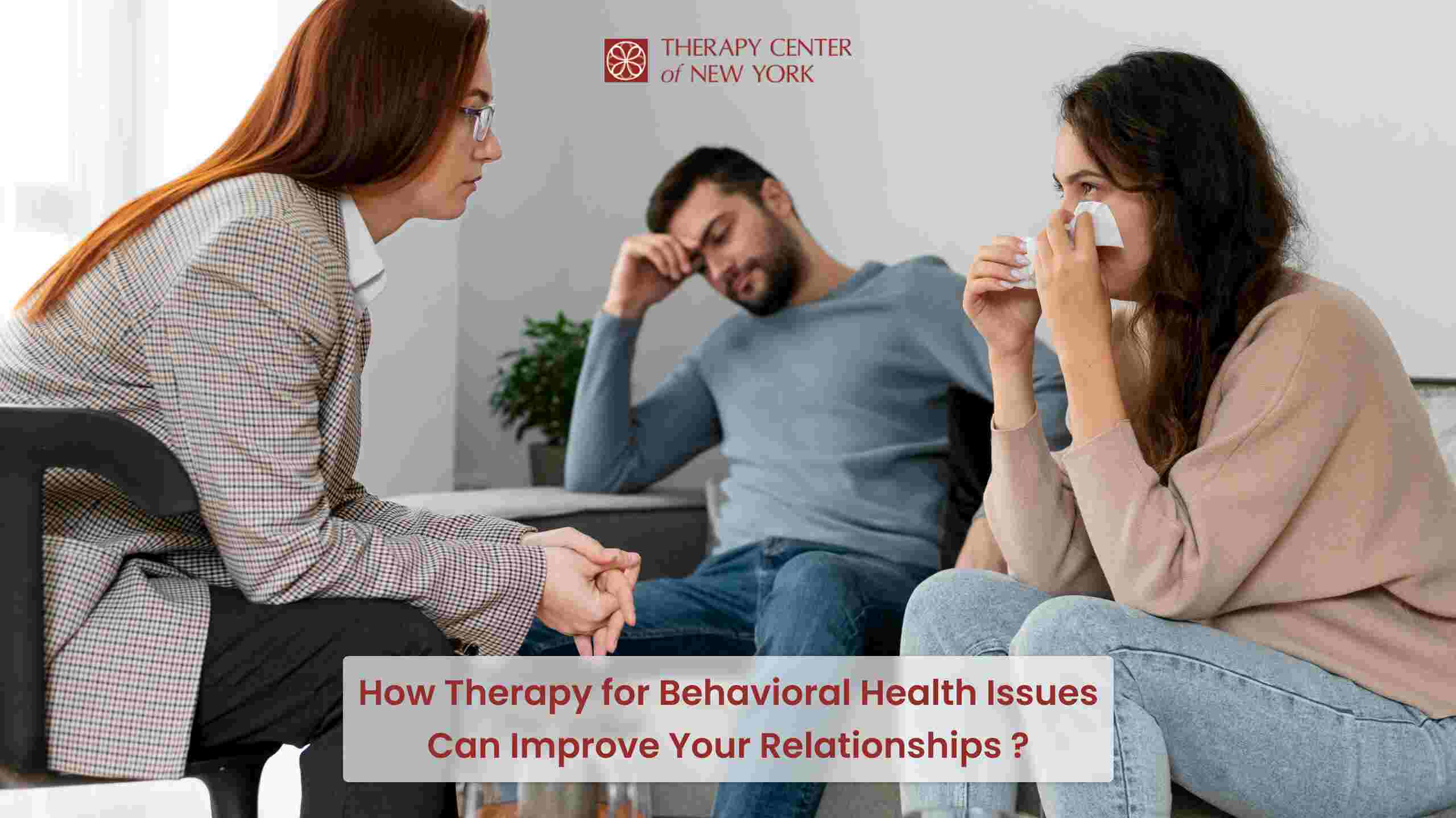How Therapy for Behavioral Health Issues Can Improve Your Relationships ?
- by The TCNY Care Team

Therapy for behavioral health conditions is about more than just your personal well-being, it can also have a significant impact on your relationships.
Whether you're dealing with anxiety, depression, or other behavioral health issues, therapy can give vital support and resources for improving your relationships. In this article, we'll look at how behavioral health counseling can help you improve your relationships, from improving your communication skills to addressing underlying issues that may be impacting your interactions with others.
Understanding Behavioral Health Counseling
Behavioral health counseling includes a variety of therapy treatments focused at treating behavioral health concerns such as anxiety, depression, trauma and other conditions. These therapies are provided by licensed experts such as psychiatrists, social workers, or psychologists. Behavioral health counseling provides support, guidance, and skills for symptom management and overall well-being.
How Therapy Helps with Relationship Issues
Improving Communication Skills
One of the major advantages of therapy for behavioral health conditions is centered on strengthening communication skills. Effective communication is critical for maintaining successful relationships, whether with a spouse, family member, friend, or colleague. Therapists teach people how to express themselves assertively, listen actively, and handle disagreements productively. Therapy strengthens relationships by improving communication skills and reducing misconceptions
Addressing Underlying Issues
Behavioral health counseling addresses underlying issues that may be affecting relationships. For example, unresolved trauma, low self-esteem, and mismanaged stress can all have an impact on how people connect with one another. Therapy offers a secure environment in which to address these difficulties, discover patterns of behavior, and build healthy coping skills. By addressing these underlying issues, people can improve their relationships and break free from harmful patterns.
Developing Empathy and Understanding
Therapy fosters empathy and understanding, which are necessary attributes for healthy partnerships. Individuals learn to perceive things from the perspective of others, validate their feelings, and engage in empathy-based relationships through treatment. This enhanced knowledge encourages stronger ties and reciprocal respect in partnerships. Therapy develops ties and promotes intimacy by developing empathy.
Types of Therapy for Relationship Improvement
Family Therapy
Family therapy entails working with the entire family to resolve relationship issues and improve communication. Family therapists assist families in resolving disagreements, establishing boundaries, and developing techniques for improved cooperation. Family therapy can help with difficulties like parent-child conflict, blended family relationships, and major life transitions. Please note that health insurance may cover family therapy sessions when one family member is separately receiving independent treatment for behavioral health issues (please check with your health insurance plan accordingly).
Individual Therapy
Individual therapy can also improve relationships by helping individuals address personal issues that may be affecting their interactions with others. Therapists work one-on-one with clients to explore their thoughts, feelings, and behaviors, identify areas for growth, and develop coping skills. By improving individual well-being, therapy enhances relationships with partners, family members, and friends.
Benefits of Therapy for Behavioral Health and Relationships
Improving Communication
Therapy improves communication skills, resulting in more productive and happy partnerships. Individuals who learn how to articulate their thoughts and feelings openly and actively listen can develop their relationships with others and settle disagreements more efficiently.
Enhancing Emotional Regulation
Therapy teaches people how to control their emotions, which reduces the risk of emotional outbursts or withdrawal in relationships. Individuals who develop healthy coping methods and manage stress more successfully can create a more stable and supportive environment for themselves and their loved ones.
Greater Empathy and Understanding
Therapy promotes empathy and understanding, allowing people to connect deeper with others and form stronger bonds. Individuals can foster greater compassion and mutual respect in their interactions by developing empathy and seeing things from the viewpoints of others.
Resolving Conflicts and Improving Problem-Solving
Therapy helps individuals and couples resolve conflicts and improve problem-solving skills. By identifying underlying issues, exploring different perspectives, and developing strategies for compromise and negotiation, therapy equips individuals with the tools they need to navigate challenges and build healthier relationships.
Strengthening Bonds and Increasing Intimacy
Therapy strengthens bonds and increases intimacy in relationships by fostering open communication, trust, and emotional connection. By addressing underlying issues and learning how to express vulnerability, individuals and couples can create deeper, more meaningful connections with each other.
Further Resources
For further background and information on how therapy can help with relationships, please refer to these three helpful resources (click on the links below):
- My Wellbeing: this article explores how therapists can help identify and address repeating patterns in relationships, improve self-understanding, and even assist in processing breakups. It emphasizes the role of therapy in fostering healthier relationships and personal growth.
- High Focus: this article explains seven ways therapy can strengthen your relationships.
- Psychology Today: this article discusses how couples therapy works, including different therapeutic approaches like the Gottman Method and Emotion-Focused Therapy. It highlights the importance of understanding relationship patterns, improving communication, and rebuilding intimacy. Please note that couples therapy is not typically covered by insurance, and is usually a self-pay option for couples to consider.
Seeking Help at the Therapy Center of New York
At the Therapy Center of New York, our experienced therapists are dedicated to helping you improve your behavioral health and relationships. Whether you're dealing with behavioral health issues, relationship problems, or simply looking to enhance your communication and connection with loved ones, we offer a range of services tailored to your needs. Our compassionate and professional team provides individual therapy and family therapy to support you at every stage of your journey. Reach out to the Therapy Center of New York today and take the first step towards a healthier, happier life and stronger relationships.
